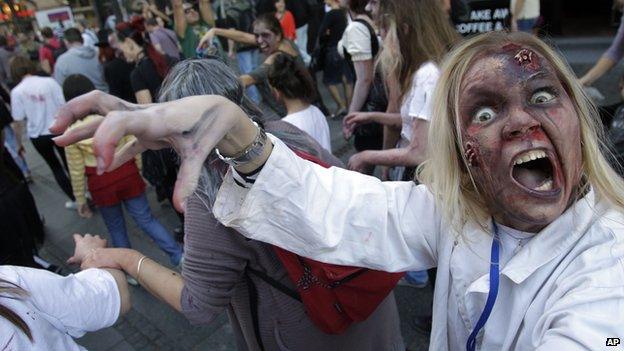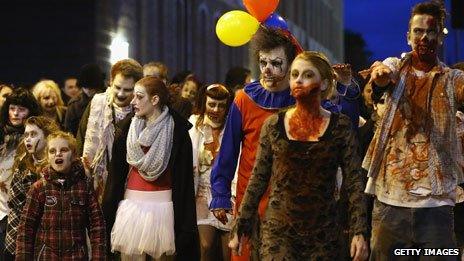Everybody's shuffling: Rise of zombies in modern life
- Published

The living dead, a long-time staple of horror films, are increasingly becoming food for thought for academics and economists. Zombies have been lurching from the entertainment business into the worlds of mathematics, science and finance. Why have zombies taken over?
The word "zombie" has its origins in the distant past.
According to Prof Adam Chodorow, author of Death and Taxes and Zombies, it appears to have its roots in Haitian voodoo.
The Oxford Dictionary says the word "zombie" emerged in the 19th Century from an African word, "zumbi", which means fetish.
Whatever its inspiration, fascination with the foot dragging, groaning undead is very much alive and kicking.
The entertainment industry has for decades been the main driver behind the popularity of zombies.
In the past few weeks, the first trailer for World War Z was released.
With action scenes shot in Glasgow's George Square and starring Brad Pitt, it has been adapted from Max Brooks' 2006 book World War Z: An Oral History of the Zombie War.
When the film opens in cinemas next year, it will join an estimated 500 zombie movies that have been made.
This year's fare of the living dead in cinemas and on TV has included the start of season three of The Walking Dead, films Cockneys Vs Zombies and Resident Evil: Retribution and children's animation ParaNorman.
For some fans it has not been enough to just sit and watch the horrors, they re-create scenes at mass gatherings called zombie walks.
This year they have been held in Birmingham and Bristol in UK, Berlin, Stockholm, Toronto, Prague, Seattle, Long Beach, and Mexico City - where last year more than 10,000 gathered to set a zombie walk world record.
And now zombies have staggered into other walks of life.
In marine biology, scientists are trying to better understand bone-eating "zombie worms" first discovered in 2004. Some scientists have suggested sinking dead whales off the Scottish coast in the hope of observing the creatures.
Economists are warning of the rise of zombie companies - struggling firms that can just about afford the interest payments on their loans - and zombie households, those on interest-only mortgages, yet unable to pay off the loan itself.
Last month, Scotland and Northern Ireland were identified as having almost double the rate of zombie firms than the rest of the UK, according to research by insolvency trade body R3.
A total of 30,600, or 18%, of Scottish and Northern Irish businesses reported they were only just staying afloat. This was double the UK average of 9% and the highest figure for any UK area.
In his paper Death and Taxes and Zombies, which was published earlier this year, Prof Chodorow examines asks a hypothetical question: should zombies be taxed?
The professor of law at Arizona State University got the idea when he witnessed first-hand an anti-greed and corruption protest in Denver, Colorado.
As the Occupy Denver demonstrators marched, Prof Chodorow caught sight of a zombie walk lurching from the opposite direction. He watched with amusements as the two groups collided and mixed together.
Prof Chodorow said: "At that moment, the following thought popped into my head: 'I wonder if zombies should be considered dead for estate tax purposes?'
'Playful way'
But serious issues lay behind the rotting, brain munching subjects of the academic's tongue-in-cheek examination.
It was written and published amid warnings that the US was headed towards a "fiscal cliff", the deadline when tax cuts expire and spending cuts kick in.
Prof Chodorow said: "In chastising Congress for failing to address zombies, I was trying to call Congress out for its utter failure to address what most people see as more pressing issues."
He added: "While this article was meant primarily as a humour piece, one of the things law professors do is to look at the law from different and unexpected angles.
"The legal analysis in the paper is all real. This article allowed me to explore a number of different issues in a playful way, which is important when you teach tax law, a subject many would rather avoid."

Writer Richmond Clements suggests zombies reflect some people's concerns about their lives
Another US academic - James Powell, a mathematical ecologist at Utah State University - uses the idea of a zombie apocalypse to help him explain how real-life viruses such as H1N1 swine flu spread.
In February, he held a public workshop called Mathematics and the Life-Impaired: How the Theory of Disease Predicts the Zombie Apocalypse.
Prof Powell said: "I like using zombie examples because it grabs the students.
"They have an intuitive sense of the disease dynamics, i.e. you get bitten, you turn into a zombie, you bite somebody else...
"They don't get paralysed with too much biological detail, and of course there is a lot of natural zombie humour and participation that we can all do.
"If I talk about polio or cholera I don't feel good about being humorous about how the disease progresses - it's all too tragic and real.
"But with zombies you can be as silly as you like and nobody is going to feel offended."
Prof Powell's fascination with zombies started when he was just five, or six. His mother, thinking young James was asleep in the back of the car, had gone to a drive-in theatre to watch Night of the Living Dead.
"Didn't sleep for a month, which set the pattern for me as a kid watching horror movies," said Prof Powell.
In the UK, zombies have been moaning and groaning across the political landscape.
Lincolnshire County Council revealed in August that it been asked in a freedom of information request about its preparedness for zombies.
And last month, the National Collective, an artists' collaboration that is pro-Scottish independence, published a spoof news story, external about "fears" that Scotland would be more vulnerable to an invasion if independent.
It comes as no surprise to Edinburgh-based film-maker David Hutchison that the living dead are so popular.
One of his first short films was Zombie Lick about a zombie that craved chocolate not flesh. He is now working on a new script about a Scottish crofting family unearthing a zombie while cutting peats.

One US mathematician describes zombie attacks to explain the spread of real viruses
Hutchison said: "The best zombie films cast a reflection of the times.
"Take the wonderful Juan de los Muertos. How would a film-maker comment on modern Cuba, and get past the censors? By shrouding it as a zombie movie, of course.
"The UK film Harold's Going Stiff, a moving yet funny film, could be seen as a comment on euthanasia, the ageing population and the strain on the NHS.
"Got a mine in Wales? Don't want to pay for a workforce? Use zombies. The Plague of the Zombies from 1966."
Richmond Clements, a writer and co-organiser of Inverness's Hi-Ex comic book convention, suggested that for some people zombies mirror personal concerns.
He said: "There is an obsession that runs through fiction, particularly, I would say, through horror and sci-fi, and that is the fear of a loss of identity.
"And this is what zombies represent. It's the fear that you as an individual are not a person but just one of a shambling, faceless crowd, no different than those around you. Of course, the real horror is that for most people this is true.
"The popularity of the zombie walk, where hundreds of people turn up in costume and go on a parade, almost lifts this into another level of irony."
But Clements also believes the zombie tale beloved of the film and TV industries is actually approaching the end of its life.
He said: "Zombies are a small part of a general malaise in the horror genre itself, where ideas, plot and character have been abandoned in favour of shock, gore, sexual violence and tiresome sequels and remakes.
"The genre needs to find some new life and new ideas, or end up (un)dead itself."
- Published22 November 2012
- Published13 November 2012
- Published9 September 2012
- Published30 January 2012